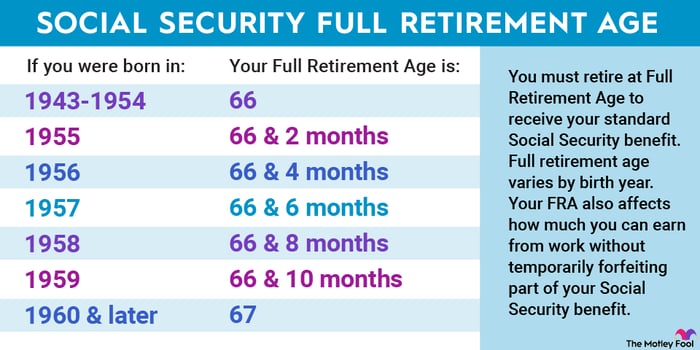Social Security is critical for millions of older adults, with 43% of baby boomers expecting their benefits to be their primary source of income in retirement, according to a 2024 report from the Transamerica Center for Retirement Studies.
Among retired workers, the average benefit across all ages is around $1,925 per month, according to the most recent data released by the Social Security Administration. However, that number varies widely depending on when someone begins claiming benefits. Here's exactly how much more you could expect to receive at age 67 compared to 62.
Where to invest $1,000 right now? Our analyst team just revealed what they believe are the 10 best stocks to buy right now. See the 10 stocks »
Your age can boost -- or slash -- your benefit amount
The age at which you file for Social Security will directly affect your benefit amount, sometimes by hundreds of dollars per month.
Your full retirement age (FRA) is the age at which you'll collect 100% of your benefit based on your work history. This age varies by birth year, but it's age 67 for everyone born in 1960 or later. Those born before 1960 will have a FRA of either 66 or 66 and a few months.

Image source: The Motley Fool.
Filing before your FRA will permanently reduce your checks, and the earlier you begin claiming, the less you'll receive each month. If you have a FRA of age 67 and you file as early as possible at age 62, your payments will be slashed by 30%.
The average retiree can expect to receive around $586 more per month at age 67 compared to 62. According to 2023 data from the Social Security Administration, the average benefit amount at age 62 is just $1,298 per month -- compared to around $1,884 per month at age 67.
Delaying claiming until after your FRA can boost your benefits even further. For those with a FRA of 67, waiting until 70 to file will earn you a 24% bonus on top of your full payment. For the average retiree, filing at 70 results in a benefit of around $2,038 per month.
Delaying benefits doesn't always pay
From a purely financial perspective, later is often better when it comes to choosing what age to file for Social Security.
According to a 2019 study from United Income, around 57% of Social Security recipients could earn more over a lifetime by filing at age 70. Furthermore, researchers found that the average retired household could earn an additional $111,000 in lifetime income by filing at the ideal age.
That said, money isn't everything in retirement. If you're battling health issues and have reason to believe you might not live well into your 70s or beyond, filing earlier could be a smart move. This strategy will reduce your monthly income, but you could receive more in total from Social Security if you end up living a shorter-than-average lifespan.
You may also choose to file early as part of a strategy with your spouse. For example, if you're 62 and your spouse is a few years older, you may choose to retire and take Social Security at the same time. Your spouse will earn larger checks by filing at a later age, which could help offset the reduction you'll face by filing early.
There are many factors to consider when deciding what age to take Social Security. While the financial side of this choice is important, it's also wise to look at the big picture and focus on your overall retirement goals and priorities.
The $22,924 Social Security bonus most retirees completely overlook
If you're like most Americans, you're a few years (or more) behind on your retirement savings. But a handful of little-known "Social Security secrets" could help ensure a boost in your retirement income. For example: one easy trick could pay you as much as $22,924 more... each year! Once you learn how to maximize your Social Security benefits, we think you could retire confidently with the peace of mind we're all after. Simply click here to discover how to learn more about these strategies.
View the "Social Security secrets" »
The Motley Fool has a disclosure policy.
The views and opinions expressed herein are the views and opinions of the author and do not necessarily reflect those of Nasdaq, Inc.


